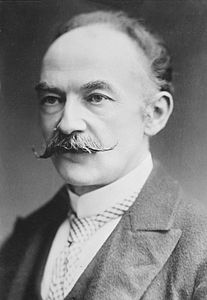Analysis of The Discovery
Thomas Hardy 1840 (Stinsford) – 1928 (Dorchester, Dorset)
I wandered to a crude coast
Like a ghost;
Upon the hills I saw fires -
Funeral pyres
Seemingly - and heard breaking
Waves like distant cannonades that set the land shaking.
And so I never once guessed
A Love-nest,
Bowered and candle-lit, lay
In my way,
Till I found a hid hollow,
Where I burst on her my heart could not but follow.
| Scheme | AABBCC DDEEFF |
|---|---|
| Poetic Form | |
| Metre | 1101011 101 01011110 10010 1000110 11101110110 0111011 011 101011 011 1110110 111101111110 |
| Closest metre | Iambic tetrameter |
| Characters | 328 |
| Words | 66 |
| Sentences | 3 |
| Stanzas | 2 |
| Stanza Lengths | 6, 6 |
| Lines Amount | 12 |
| Letters per line (avg) | 21 |
| Words per line (avg) | 5 |
| Letters per stanza (avg) | 129 |
| Words per stanza (avg) | 32 |
Font size:
Submitted on May 13, 2011
Modified on March 05, 2023
- 19 sec read
- 111 Views
Citation
Use the citation below to add this poem analysis to your bibliography:
Style:MLAChicagoAPA
"The Discovery" Poetry.com. STANDS4 LLC, 2024. Web. 27 Apr. 2024. <https://www.poetry.com/poem-analysis/36505/the-discovery>.


Discuss this Thomas Hardy poem analysis with the community:
Report Comment
We're doing our best to make sure our content is useful, accurate and safe.
If by any chance you spot an inappropriate comment while navigating through our website please use this form to let us know, and we'll take care of it shortly.
Attachment
You need to be logged in to favorite.
Log In